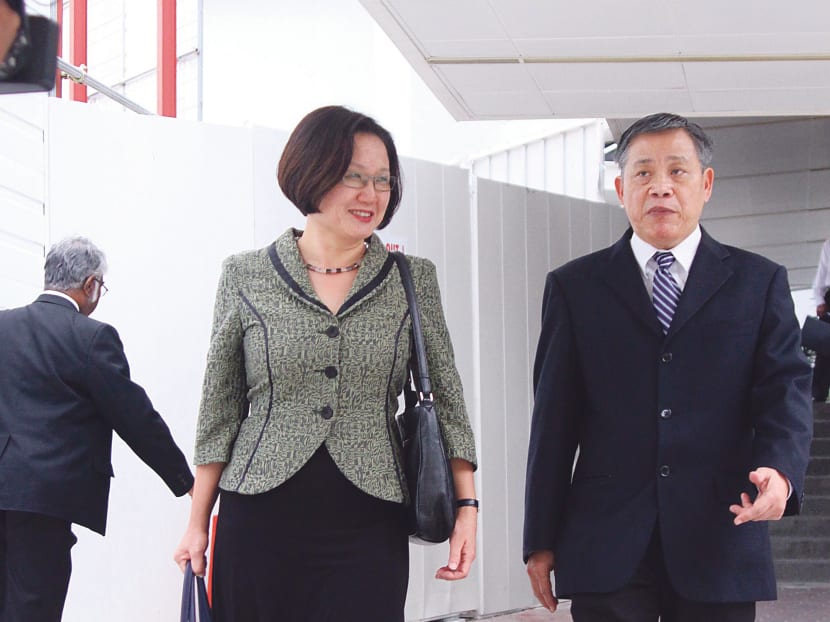Town council did not say CNY event was a ‘mini-fair’ in email: Prosecution
SINGAPORE — Despite its assertion in court that a Chinese New Year fair held in January was a “mini-fair” and a “community event”, the Aljunied-Hougang-Punggol East Town Council (AHPETC) had never described the event as such in its earlier email exchanges with the National Environment Agency (NEA), the prosecution said yesterday.

Ms Sylvia Lim (left, with lawyer Peter Low) disagreed with the prosecution’s claims that AHPETC had not taken ‘reasonable care’ to avoid violating the law. PHOTO: ERNEST CHUA
SINGAPORE — Despite its assertion in court that a Chinese New Year fair held in January was a “mini-fair” and a “community event”, the Aljunied-Hougang-Punggol East Town Council (AHPETC) had never described the event as such in its earlier email exchanges with the National Environment Agency (NEA), the prosecution said yesterday.
The town council did not use those two terms even after it was told by the NEA that the event constituted a “temporary fair”, NEA prosecutor Issac Tan charged during his cross-examination of AHPETC chairman Sylvia Lim.
The event, held at Hougang Central Hub from Jan 9 to Jan 30, had five stalls selling items such as festive flowers and potted plants.
Under Section 35 of the Environmental Public Health Act (EPHA), a permit is necessary for “any temporary fair, stage show or other such function or activity”.
During the two-and-a-half-day trial, which started on Tuesday, AHPETC had said that the festive event did not require a permit as it was a “mini-fair” or “community event”.
In response to a question by Mr Tan yesterday, Ms Lim said the town council did not include the fact that the January event was a “mini-fair”, and thus did not require a permit, in an email it had sent to the NEA on Dec 24.
Mr Tan then asked if the same email — which said the NEA application forms were irrelevant to the event — had stated that it was a “community event”, and so a permit was not required. In her reply, Ms Lim referred to a Jan 9 letter from Workers’ Party chief Low Thia Khiang to the NEA that she said described the nature of the event. In his letter, Mr Low had said, among other things, that the fair would bring a sense of holiday cheer to the community.
Mr Tan later questioned why AHPETC had submitted the application forms if it believed that a permit was not needed. Ms Lim said the town council was not an “authority” on whether a permit was required or not, and it “did not want any problem” at the event, which she described as a “community event” on a “small-scale”.
Mr Tan then charged that AHPETC had on two occasions — Dec 31 last year and Jan 8 — forwarded documents to the NEA which showed clearly that the town council had accepted the need to obtain a permit.
Ms Lim said she did not agree with his statement. She also disagreed with his claims that the town council had not taken “reasonable care” to avoid violating Section 35 of the EPHA, and that it had “persistently flouted the law” during the duration of the Chinese New Year fair.
The trial ended yesterday after two AHPETC employees testified on procedural matters, such as the authenticity of documents that were presented to the court.
District Judge Victor Yeo is expected to deliver his ruling at the end of next month. If found guilty, AHPETC could be fined up to S$1,000.






